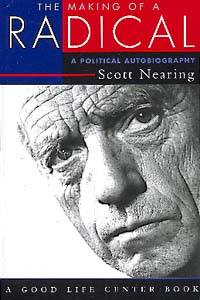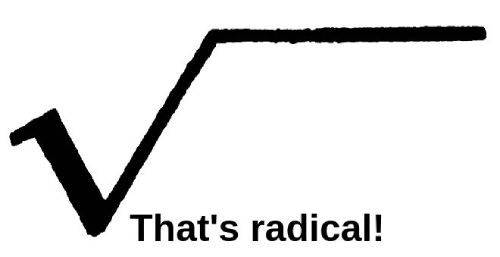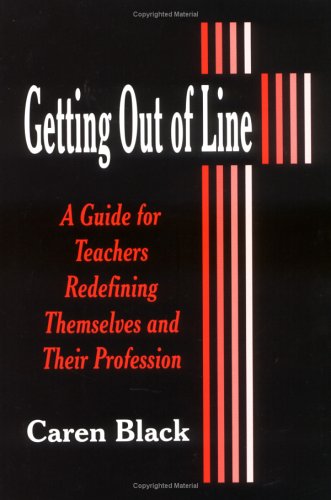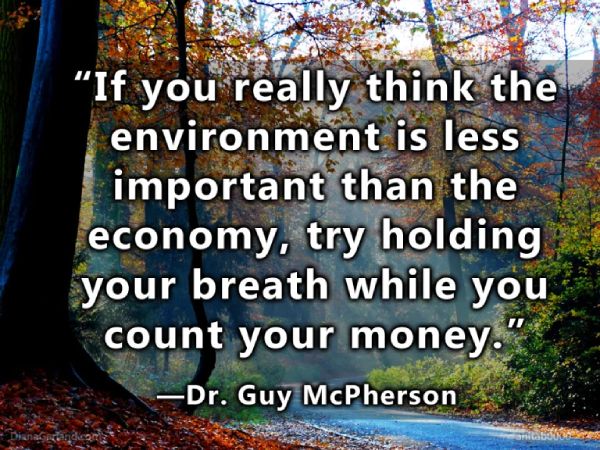You probably recognize the symbol, though you might have forgotten its name: √. When I would write the symbol on the whiteboard in a class, and ask what it is, the response was invariable: The square root.
I respond: Yes, its function is to take the root, including the square root or any other root. But what is it called?
Extended silence ensues, followed by, The square-root symbol.
I join the abundant laughter.
Really? Nobody took math in junior high?
Nervous laughter.
I’ve insulted everybody here within the first minute of our meeting, I’d say. Now that that’s out of the way, we can proceed.
A long pause before I give away the answer: It’s called a radical. Another long pause before I reveal the point of this exercise. It’s called a radical because it gets at the root. That, by the way, is the definition of radical: “of or going to the root or origin.” You can look it up, if you’d like.
I used this anecdote to introduce myself to various classes. I’m a radical, I point out. And, whereas this culture has convinced most people that a radical is a bad thing, similarly to anarchy, it’s actually not a bad thing, and it’s different than most people believe.
A reminder: Chaos is what happens in a system with no rules, or no attention is paid to the rules. Anarchy, on the other hand, is a system without rulers. Think of it as southwestern American writer Edward Abbey did, a system with southwestern American writer Edward Abbey did, a system with maximumdemocracydemocracy. According to Cactus Ed’s 1988 book, One Life at a Time, Please, anarchism has, “the maximum possible dispersal of political power, economic power, and force, or military power. An anarchist society consists of a voluntary association of self-reliant, self-support, autonomous communities. The anarchist community would consist of a voluntary association of free and independent families, self-reliant and self-supporting but bound by kinship ties and a tradition of mutual aid. Anarchy is democracy taken seriously.”
Just as anarchy is often misunderstood, so, too, is radicalism. However, radical simply means, “of or going to the root or origin.” On this topic, the words of H. L. Mencken resonate with me: “The notion that a radical is one who hates his country is naive and usually idiotic. He is, more likely, one who likes his country more than the rest of us, and is thus more disturbed than the rest of us when he sees it debauched. He is not a bad citizen turning to crime; he is a good citizen driven to despair.”
A good citizen driven to despair. That sounds about right. American newsman, essayist, satirist, social critic, Mencken was an outspoken defender of liberty in the first half of the 20th Century.
 The following words, like those from Mencken, resonant with me. They were written by Scott Nearing and published in 1972 in his autobiography, The Making of a Radical. He was 89 years old at the time. References to his youth and to the early part of the century offer his perspective from the early 1900s.
The following words, like those from Mencken, resonant with me. They were written by Scott Nearing and published in 1972 in his autobiography, The Making of a Radical. He was 89 years old at the time. References to his youth and to the early part of the century offer his perspective from the early 1900s.
“The perfect parrot was the perfect pupil …. As students in grammar school or in high school we seldom question the truth of any statement. Instead, our concern was to get each phrase exactly as the teacher or textbook stated it …. Imagine the effect of years of such training on the developing mind. The habit of mental conformity becomes almost ineradicable. I was merely one of generations of victims. How many teachers suggested to us that the established order was not all that it might be? Even the possibility of change was hinted at only vaguely. We were not rebels. We were not pioneers. We were not even enthusiastic or devout copyists. We were mere discs on which the language of our generation was cut. At certain intervals, called examination periods, we were expected to reproduce this language, word by word and paragraph by paragraph.”
“The American Way was not based on ‘life, liberty and the pursuit of happiness,’ but upon the determination of business men to hold down wages and push up profits. The American Way was designed to make the rich richer while it kept the poor in their places.”
“I live in the United States only because my post of duty is there …. I am ashamed of any connection with the oligarchy which presently misgoverns, exploits, plunders, and corrupts the United States and the world.”
“As an individual, I continue to do what I can. I go about, talk, and write in the face of ignorance, inertia, escapism. I believe there is a growing awareness of the crisis and the gravity of the menace hanging over humanity. … My personal contribution is increasingly a form of foreign aid — a contribution to fellow citizens whom I seem not to know. They are a people without history, misled, deluded, inexperienced, baffled. They are people who are turning more and more away from reason and foresight to instinct, emotion, and pathetically desperate efforts to escape a fate that is closing in around them as a fog envelops a ship at sea.”
“With increasing awareness of the real situation there has grown up in me a conviction that I should do something about it. I have tried talking, writing, speaking, lecturing, and have been bypassed and ignored by my fellow Americans. I continue to do what I can, at every opportunity. I have spoken my lines as I have thought them out and learned them. I continue to offer my help to my fellow Americans as one would offer help to a drowning man who every moment is being carried farther away by an irresistible current. I offer this aid gladly, hopefully, anxiously. Like the Ancient Mariner, I am saying to preoccupied passersby: you have chosen and are following a path that leads to your destruction and probably to the destruction of hundreds of millions of your fellows. I have advised, opposed, warned, decried, denounced. You continue on your way to perdition. You rush on, unheeding. I continue to warn. You do not look and do not listen. You do not see the infinitely rich possibilities of life, lying unused at your feet. You go your own way — the way that millions of humans have gone before you, lured and corrupted by the glass beads and printed calicos which civilized societies offers to its devotees.”
“I have turned my back on the American Oligarchy, the American Way of Life, and American Century, the American Empire, western civilization. The entire chain of civilizations have brought a little light, learning, joy, and hope to a very few human beings while multitudes lived and died in darkness, ignorance, misery, despair. I have turned my back on this short-sighted, opportunistic acceptance of that which is, because I am convinced that we could reach out, create, touch, and grasp a better life and make it ours, if only we would put forth the effort.”
“I have burned the last bridge which connected me with the American Way of Life because I am convinced that the ideas, devices, techniques, and institutions of civilization have been tried time after time and found wanting. They are superfluous and obsolete because better ways are already in being, available to any who will turn their backs on the past and face the future hopefully, confidently, creatively, and conscious of the need for concerted, radical action.”
“The affluent, drugged, debauched, corrupted, polluted, deluded nation is a country I never envisioned in my youth. It is an alien and hostile land. When I return to it I cannot say happily, ‘I am going home.’ Instead, I must gird myself and prepare to return to a foreign and none too pleasant habitat.”
“Teaching is my job. Teaching, in its largest sense means searching out the truth, telling it to all who are willing to learn, and building it into the life of the community. Truth is often unpleasant, annoying, and unpalatable to those who hold a disproportionate amount of worldly goods, who are power hungry, and who are pushing a cause to the detriment of the many. So they try to avoid truth, to cover it up, to forget it. It is the job of the teaching profession, of which I have been a lifetime member, to keep on uncovering the truth, reminding the rich and powerful of its character and its significance, bringing it to public attention, and arguing that it be made the cornerstone of local, regional, national and planet-wide public life.”
More than a century later, I am afflicted with a form of radicalism similar to that which plagued Mencken and Nearing. I am ignored or disparaged when I point out the actions taken to prop up an empire in decline, the obvious signs of human-population overshoot, and the likely near-term results, as well as the root causes of overshoot.
How radical are you? Do you love life, including the continuation of your own?
Edge of Extinction: Living Alone in a World of Wounds
{vembed Y=Vyo5meMOQC4}
Author
"Dr. Guy McPherson is an internationally recognized speaker, award-winning scientist, and the world’s leading authority on abrupt climate change leading to near-term human extinction. He is professor emeritus at the University of Arizona, where he taught and conducted research for twenty years. His published works include 14 books and hundreds of scholarly articles. Dr. McPherson has been featured on TV and radio and in several documentary films. He is a blogger, cultural critic, and co-host of his own radio show “Nature Bats Last.” Dr. McPherson speaks to general audiences across the globe, and to scientists, students, educators, and not-for-profit and business leaders who seek their best available options when confronting Earth’s cataclysmic changes." source









